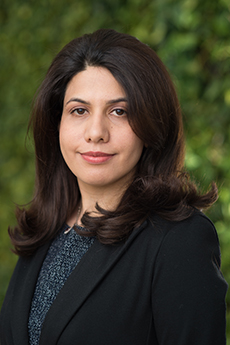Faculty News
In Memoriam:
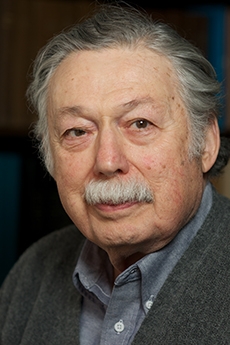
We are sad to report that Dr. Edward Della Torre, professor of engineering and applied science, and a longtime faculty member of ECE, passed away during the winter break. Dr. Della Torre joined GW in 1982. He was a scholar and researcher in the field of magnetic material behavior and modeling, and was the director of GW’s Institute for Magnetics Research.
Anyone who wishes to provide condolences should please contact ECE's operations manager, Robert Baden. Dr. Della Torre’s family is requesting that no flowers be sent, and that if anyone wishes to make a donation, to please make one to: medical research for cardio and heart-related areas; medical research for the treatment, prevention, and cure of lupus; or the Baltimore Symphony Orchestra OrchKids program.
Research:

Dr. Payman Dehghanian (ECE) was awarded the Myron-Zucker IEEE-IAS Student-Faculty Grant Program Fund for the project “Power Grid Resilience to Extreme Weather Conditions: Unlocking the Full Potential of Grid-Scale Renewables and Battery Storages.” This $25,000 grant is from the IEEE Foundation.

The National Institutes of Health’s National Heart, Lung, and Blood Institute has awarded Dr. Igor Efimov (BME) a four-year, $2.5 million R01 grant for the project “High-Definition Conformal Electronics for VT/VF.” Ventricular fibrillation (rapid and irregular heart beat) is responsible for 300,000 sudden cardiac deaths (SCD) annually in the United States. Current treatment options have limited efficacy and are hampered by serious side effects. Future development of an effective therapy requires detailed knowledge of the disorganized electrical waves in the fibrillating human ventricles. This project will apply novel organ conformal chiplet electronics real-time networks technology to track the development and propagation of these rapid, disorganized electrical waves and terminate them with high precision and minimized side effects, thereby creating a targeted individualized therapy dynamically tailored for each arrhythmia episode for each patient.
Dr. Emilia Entcheva (BME) and Dr. Matthew Kay (BME) are the MPIs (Multiple Principal Investigators) on a four-year, $2.8 million grant from the National Institutes of Health’s National Heart, Lung, and Blood Institute. The project, “Scalable platform for optimizing human cardiac tissue engineering via optical pacing and on-demand oxygenation,” will develop new high-throughput, all-optical technology for chronic monitoring and control of human stem-cell-derived heart cells. The team will combine optogenetics, on-demand oxygenation with perfluorocarbon nanocarriers, microfluidics, optical instrumentation and control, as well as transcriptomics analysis, to help improve the maturity of these human heart cells and their use in drug screening applications. Data analytics on the generated large experimental data sets will be leveraged in constructing computational models for in silico personalized medicine. The team includes Dr. Zhenyu Li (BME), Dr. Anelia Horvath and Dr. Anastas Popratiloff (School of Medicine and Health Sciences), and Dr. Yordan Kostov (Center of Advanced Sensor Technology, UMBC). Dr. Entcheva is the contact MPI for the project.
Dr. Matthew Kay (BME) has received a four-year, $2.17 million R01 grant from the National Institutes of Health’s National Heart, Lung, and Blood Institute. Dr. Kay is the principal investigator of the project, titled “Hypothalamic neuron activation to blunt myocardial remodeling during chronic sleep apnea.” His co-investigator is Dr. David Mendelowitz (School of Medicine and Health Sciences). The goal of the project is to identify the specific impact of obstructive sleep apnea (OSA) on cardiac health. Patients suffering from OSA have a three-fold increase in cardiovascular mortality, yet very little is known regarding how OSA directly increases the risk for cardiac disease. The studies will also test the innovative hypothesis that appropriately timed activation of a small population of hypothalamic paraventricular neurons will slow the development of, or reverse, the deleterious autonomic and neurocardiac alterations that occur during OSA.
Conferences & Presentations:
Dr. Leila Farhadi (CEE) gave the talk “Coupled estimation of evapotranspiration and recharge from remotely sensed soil moisture and temperature” at the American Meteorological Society meeting held January 8 in Phoenix, AZ.
Dr. Volker Sorger (ECE) was awarded the Highest Expected Future Impact Paper prize at the 2018 Cognitive Computing Conference, held December 18-20 in Hannover, Germany. The paper, titled “Photonic Neuromorphic Processors and Convolutional Neural Network Accelerator,” represented a joint effort with Dr. Tarek El-Ghazawi (ECE) and Dr. Paul Prucnal (Princeton).
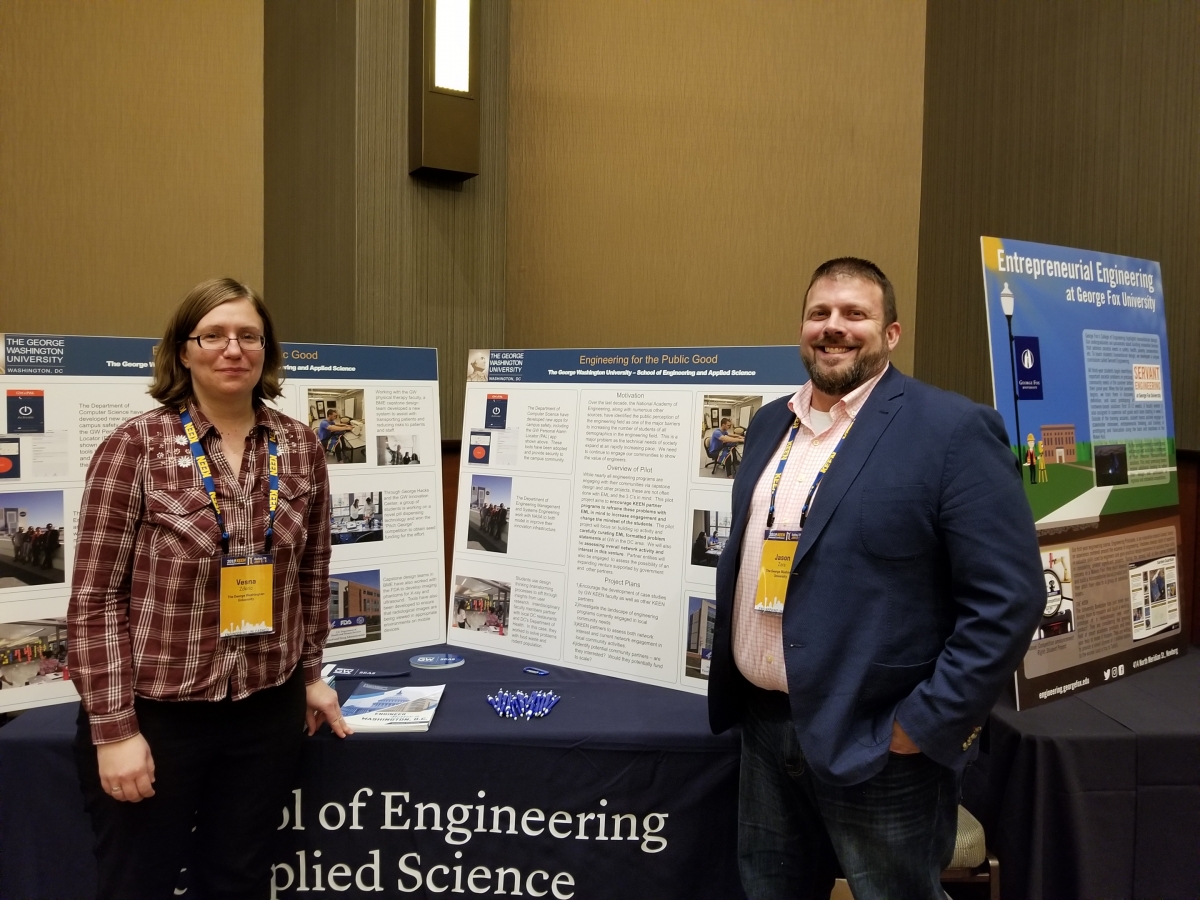
Dr. Jason Zara (BME), Dr. Vesna Zderic (BME), Dr. Shahrokh Ahmadi (ECE), and Dr. Ekundayo Shittu (EMSE) attended the KEEN National Conference, held January 3-5 in Dallas, TX. KEEN is a network of universities that focus on developing an entrepreneurial mindset in engineering undergraduates. Developing this mindset helps students learn how to be curious about the problems surrounding them, make connections between diverse areas of information, and create value for the world by developing engineering solutions to important problems. GW joined KEEN in the fall of 2018 and is very excited to work with our partners to improve undergraduate engineering education.
Dr. Kelly Scanlon (senior research scientist, Environmental and Energy Management Institute) co-led and sponsored a meeting of chemical risk management personnel from the Department of Defense for an all-day meeting on January 9. The team discussed strategic planning for the new year and opportunities for strengthening partnerships.
Publications:
Dr. Payman Dehghanian (ECE) and his collaborators at Texas A&M University recently published two articles: 1) P. Dehghanian, B. Zhang, T. Dokic, and M. Kezunovic. “Predictive Risk Analytics for Weather-Resilient Operation of Electric Power Systems,” IEEE Transactions on Sustainable Energy, Vol. 10, No. 1, pp. 3-15, January 2019; and 2) B. Zhang, P. Dehghanian, and M. Kezunovic. “Optimal Allocation of PV Generation and Battery Storage for Enhanced Resilience,” IEEE Transactions on Smart Grid, Vol. 10, No. 1, pp. 535-545, January 2019.
Dr. Murray Loew (BME) has published a collaborative journal article with his doctoral student Shuyue (Frank) Guan and with Dr. Huda Asfour (School of Medicine and Health Sciences/BME) and Dr. Narine Sarvazyan (School of Medicine and Health Sciences): S. Guan, H. Asfour, N. Sarvazyan, and M. Loew. “Application of unsupervised learning to hyperspectral imaging of cardiac ablation lesions,” Journal of Medical Imaging, 5(4), 046003 (2018), doi: 10.1117/1.JMI.5.4.046003.
Other News:
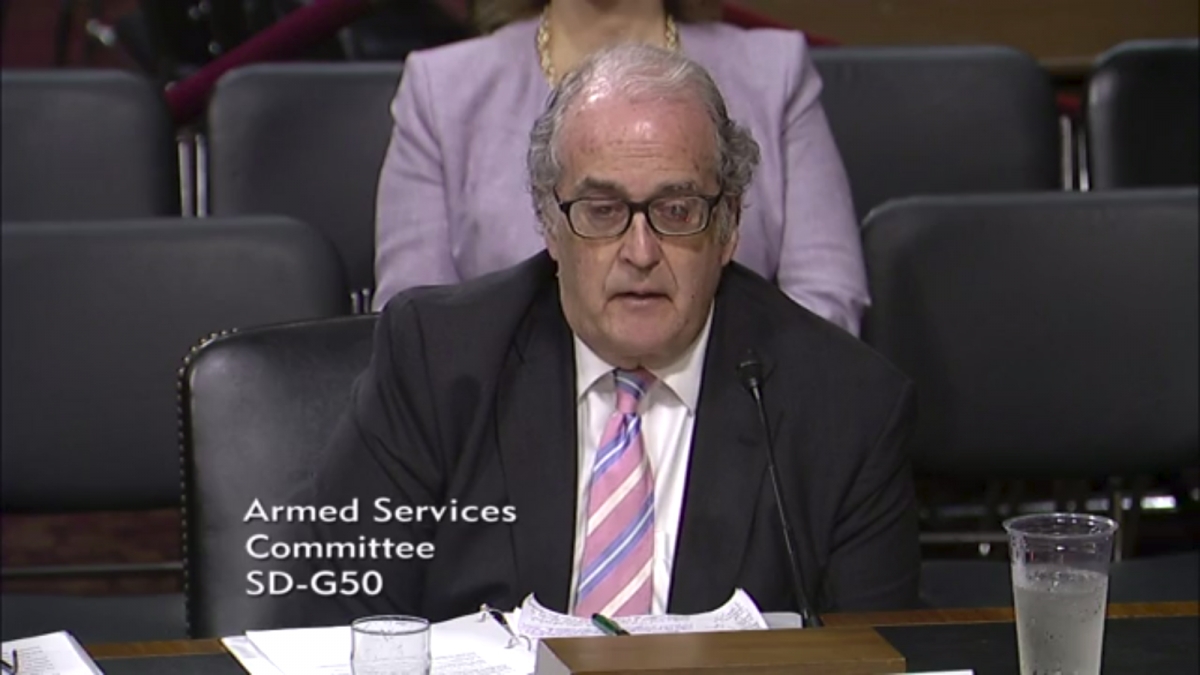
Mr. Alex Beehler (former research professor, Environmental and Energy Management Institute) was confirmed by the U.S. Senate on January 2 to be the assistant secretary of the Army for installations, energy, and environment. He will assume his new duties at the Pentagon on January 14, and will have responsibility for establishing policy, providing strategic direction, and supervising all matters pertaining to infrastructure, energy, and environmental programs affecting U.S. Army installations and contingency bases worldwide.
Dr. Murray Loew (BME) was the mentor of Ishana Shastri in the Medical Imaging and Image Analysis Laboratory in the summer of 2018. Ishana, a senior at Poolesville High School, has just been named a top 300 scholar in the 78th Regeneron Science Talent Search for her project “Region-Based Fully Convolutional Network for the Localization of Tumors in Mammograms.” (Another of the top 300 scholars, Sam Lossef, a senior at School Without Walls, is now working in Dr. Loew's lab. Sam’s mentor and project were at the Naval Research Laboratory.)
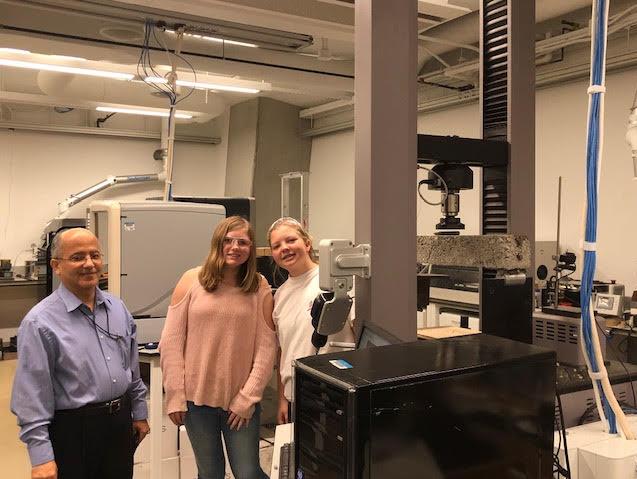
On January 9, Beatrice Savarie and Nolan Dawson, 9th Grade students representing the National Science Fair Project at TC Williams High School (Alexandria VA), visited the Material Laboratory at GW’s Science and Engineering Hall, to test 24 concrete prisms. The goal of their project was to study alternative reinforcement materials that may be readily available in developing countries, if steel bars are not available. They tested concrete prisms reinforced with traditional steel rebar, natural rope, bamboo, corn stalks, and braided cotton t-shirt strips. The test allowed the team to observe the behavior of each reinforcing material. Many thanks to Mark Wagner (Material Lab technician), Dr. Majid Manzari (CEE), and Dr. Sameh Badie (CEE), who provided help and support to the team.
Student News
ECE doctoral student Bo Wang is one of six awardees worldwide to receive the 2019 IEEE Industry Application Society (IAS) Myron Zucker Award on Electrical Safety through Design Student Initiative. His submission was titled “Electrical Safety Considerations in Large-Scale Electric Vehicle Charging Stations.” This program awards talented and promising students who have a passion for electrical safety by subsidizing travel, lodging, and registration for participation in the IEEE IAS Electrical Safety Workshop. Bo will present his proposal at the 2019 workshop, which will be held March 4-8 in Jacksonville, FL. Bo is advised by Dr. Payman Dehghanian (ECE).
Upcoming SEAS Events
BME Seminar: “Single Molecule Studies of Cell Membrane Remodeling: Implications for Cancer Metastasis”
Speaker: Dr. Inhee Chung (GW School of Medicine and Health Sciences)
Wednesday, January 30
11:00 am – 12:00 pm
Marvin Center, Rooms 413-414
External Events
OVPR Seminar: “What is the Future of Data Science in the D.C. Region?”
Speaker: Dr. Kirk Borne, Principal Data Scientist and Executive Advisor, Booz Allen Hamilton
Tuesday, January 15
3:30 – 4:30 pm
SEH, B1220
Register
Entrepreneurship News & Events
The GW New Venture Competition (GW NVC) deadline is a few weeks away (February 6), but you still have time to enter. Who knows, you could walk away with the $10,000 clean energy prize or dozens of other prizes. At the very least you will get feedback on your idea to make it stronger. Make sure to apply by 1:00 pm on February 6.
NSF Innovation Corps Info Session
Friday, January 18
12:00 – 1:00 pm
District House, Room B205 (2121 H Street NW)
Register Here
This info session will share program and funding opportunities at GW for anyone with an idea, innovative research, or side hustle! I-Corps is a lean startup boot-camp, sponsored by the National Science Foundation, and designed to foster an innovation ecosystem in the nation’s capital. These programs are free and open to all GW faculty, students, and post-docs. The info session is hosted by the GW Office of Innovation & Entrepreneurship.
Panel Discussion: “Becoming an Entrepreneur: How to Harness Your Passion to Make Your Dream a Reality”
Wednesday, January 23
5:30 – 7:00 pm
Marvin Center, Room 302
Register
In partnership with the GW Honey W. Nashman Center for Civic Engagement and Public Service's King Week, this panel event will feature several innovative and successful entrepreneurs who will discuss how students can follow their dreams of starting their own ventures.
Webinars and Workshops: New Venture Competition 101
Thursday, January 24 | Monday, January 28 | Monday, February 4
Register for the In-Person Workshop (District House B117)
Register for the Webinars
Join the GW Office of Innovation & Entrepreneurship for an info session on how you can compete with your start-up idea in one of the nation’s top university competitions! Don’t miss out on your chance to compete for up to $300,000 in total prizes!
Panel Discussion: “Life After Shark Tank: It’s Not Just About The Money”
Wednesday, January 30
5:30 – 7:00 pm
Marvin Center, Betts Theatre
Register
The GW Office of Innovation & Entrepreneurship is excited to bring in a panel of previous Shark Tank participants and current DC-based entrepreneurs to talk with budding student entrepreneurs on campus about what it takes to really get in front of an investor and how to land those imperative business deals.




